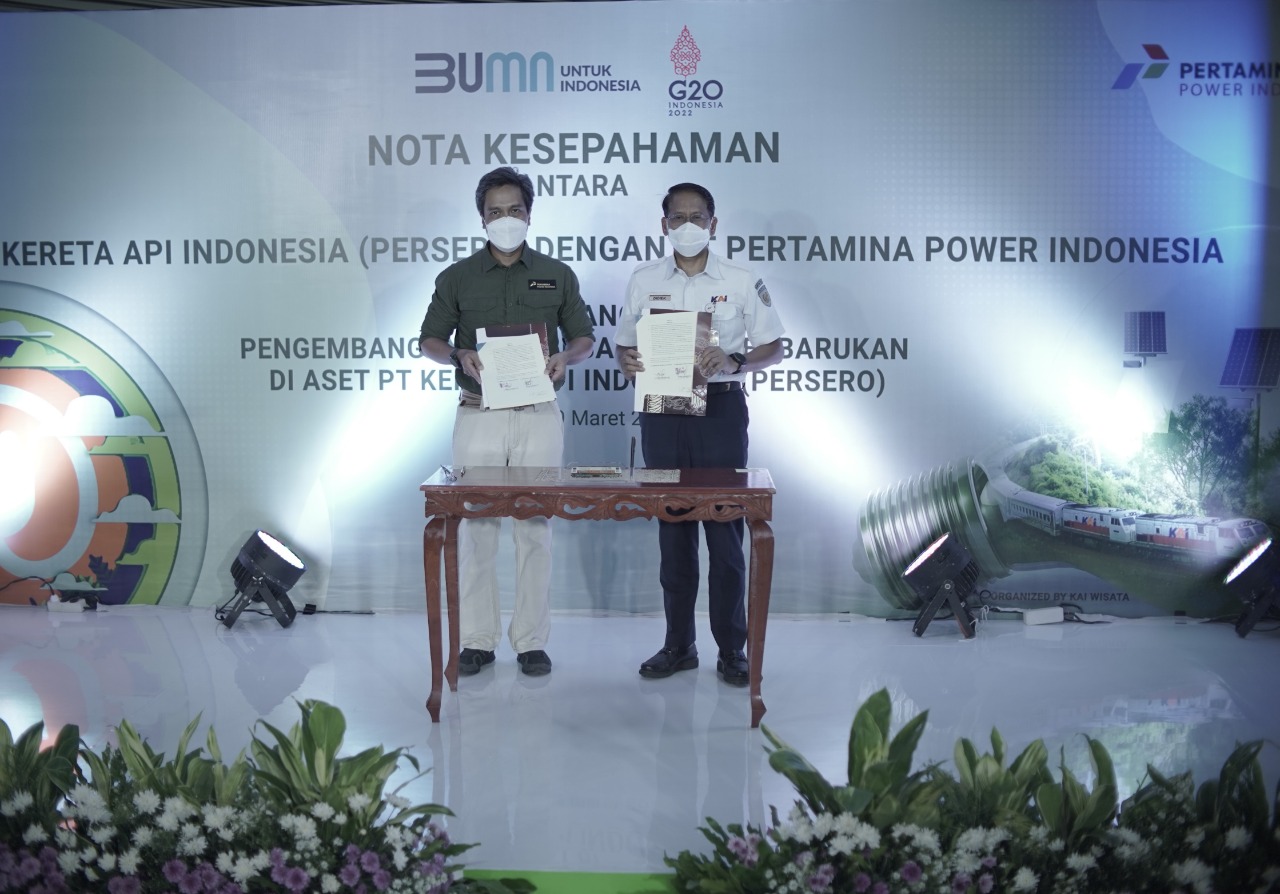
Developing New Renewable Energy in KAI Assets, Pertamina NRE - KAI Signs MoU
March 10, 2022 - PT Kereta Api Indonesia (Persero) signed a Memorandum of Understanding (MoU) with Pertamina NRE regarding the New & Renewable Energy Development Cooperation Plan in KAI Assets. The MoU was signed by President Director of KAI Didiek Hartantyo and Chief Executive Officer of Pertamina NRE Dannif Danusaputro at Gambir Station, Jakarta, Wednesday (9/3).
This MoU is intended as a basis for discussing or preparing plans for cooperation in the provision of facilities and infrastructure as well as the development of NRE such as Solar Power Plants (PLTS) and the use of other NRE in KAI's assets.
"KAI's commitment in implementing Environmental, Social & Governance (ESG) Management is increasingly visible, by supporting government programs and contributing to reducing greenhouse gas emissions by 29% in 2030 and Net Zero Emissions in 2060," said President Director of KAI Didiek Hartantyo.
Through this synergy, KAI and Pertamina NRE support the government's program to welcome Indonesia's G20 Presidency closely related to the sustainable energy transition program.
"Pertamina NRE is ready to optimally collaborate with KAI by providing environmentally friendly energy in KAI's operational areas. It is a strategic step to carry out decarbonization through SOE synergy. For now, the biggest potential is the provision of PLTS. In the future, another potential cooperation between Pertamina NRE and KAI is the use of hydrogen, which we are currently developing," said Dannif in his speech.
Previously, a mapping of PLTS energy potential at 70 KAI stations was carried out. It was 229,705 kWh/month or 2.75 MWh/year, thus potentially reducing carbon dioxide by 179,459,810.6 kg CO2/year.
In implementing Environmental, Social & Governance in the company, KAI uses the station's natural air circulation, energy-efficient lighting, prioritizes local workers, and prepares various permits and recommendations related to company buildings.
Didiek said that KAI will continue to make efforts to preserve the environment. Currently, KAI has planted nearly 56,000 trees in various areas of KAI's operations.
"With the implementation of ESG at KAI, a sustainable business will be created. Therefore, we can also maintain the sustainability of the railway industry properly," said Didiek.
In the initial stage, there are nine planned stations in the Daop 1 Jakarta area with an estimated installed capacity of 0.5 MWp and 3 Balai Yasa, namely Balai Yasa Manggarai, Balai Yasa Yogyakarta, and Balai Yasa Surabaya, with an estimated installed capacity of 0.5 MWp. In the future, KAI will also implement rooftop solar panels at stations and other KAI asset buildings that have potential. PLTS utilization in KAI's assets is a form of implementing energy conservation, efficiency and increasing environmentally friendly solar energy utilization.
Previously, the installation of PLTS had also been carried out at Batang Station with a capacity of 6 kWp and at Garut Station with a total capacity of 60 kWp. KAI will continue to increase the number of buildings installed by PLTS to support the use of green energy.
Moreover, KAI has implemented various other environmentally friendly policies in station management. For example, using the station's natural air circulation, using energy-efficient lighting, and managing waste by dividing waste by type.
Pertamina NRE itself has installed PLTS in various locations, both external and internal to Pertamina. Last year Pertamina NRE installed PLTS in the Sei Mangkei Special Economic Zone (SEZ) with an installed capacity of 2 MWp, PLTS RU IV Cilacap with a capacity of 1.34 MWp, and PLTS RU II Dumai with a capacity of 2 MWp. Furthermore, Pertamina NRE has also provided Rooftop PLTS at 129 Pertamina petrol stations, and currently, 141 petrol stations use Rooftop PLTS.
Pertamina NRE is fully committed to supporting the achievement of the net-zero emission target in 2060. This step is also Pertamina NRE business management's integrated environmental, social, and governance (ESG) aspects implementation.**